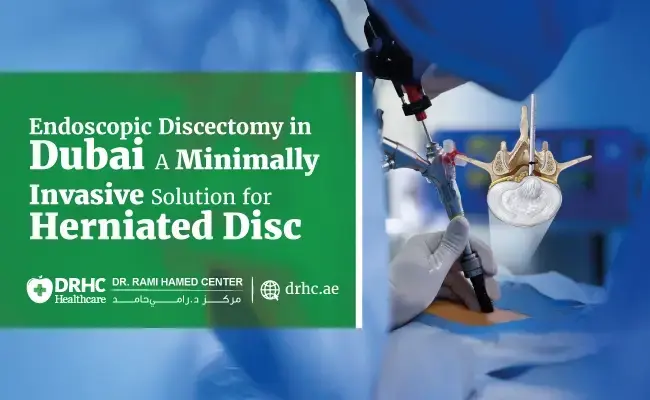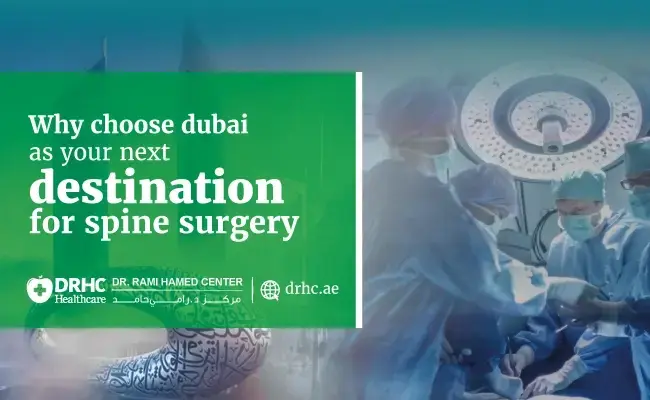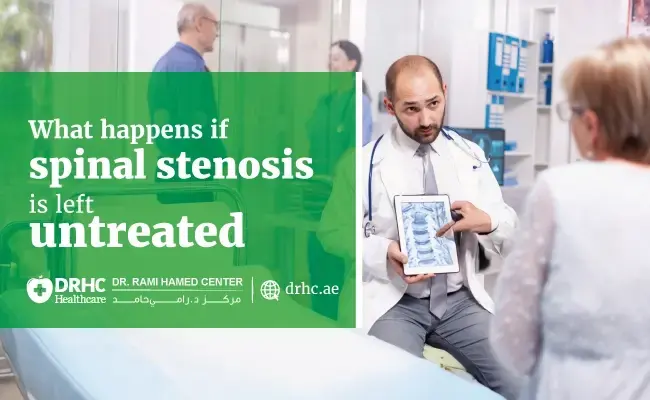
Back and neck pain are among the most common reasons people seek medical care—but not every case needs surgery. At Dr. Rami Hamed Center (DRHC Dubai), our goal is to provide the most effective and least invasive treatment possible, and surgery is only considered when necessary.
So how do we decide if spine surgery is right for you? Here’s how our experienced spine specialists evaluate each case to make the best decision for your health.
1. Understanding Your Symptoms
The first step is a detailed consultation. We look closely at:
- Type, location, and severity of pain
- Duration of symptoms
- Presence of numbness, weakness, or tingling
- Difficulty walking, standing, or maintaining balance
If your symptoms are mild and manageable, we often start with conservative treatments.
2. Reviewing Your Medical History & Physical Exam
Your medical history gives us important clues about the underlying cause of your condition. Combined with a neurological and physical exam, we can assess:
- Nerve function
- Reflexes and muscle strength
- Range of motion and pain triggers
3. Advanced Imaging and Diagnostics
Imaging is key to making an accurate diagnosis. We typically use:
- MRI to assess disc herniation, nerve compression, or spinal stenosis
- CT scans or X-rays to check for fractures, alignment issues, or degeneration
- Electromyography (EMG) if nerve damage is suspected
These tests help us pinpoint the source of your pain and evaluate whether surgical intervention is necessary.
4. Non-Surgical Treatments Come First
At DRHC Dubai, we always begin with conservative options such as:
- Physiotherapy
- Pain management (medications or injections)
- Lifestyle modification and exercise therapy
If you show improvement with non-surgical care, surgery may not be needed at all.
5. When is Surgery the Right Choice?
We consider spine surgery only when:
- Non-surgical treatments have failed after several weeks or months
- You have progressive neurological symptoms (e.g., worsening weakness or numbness)
- Imaging clearly shows structural issues like severe disc herniation, spinal instability, or spinal cord compression
- There’s a significant impact on your quality of life or risk of permanent nerve damage
6. Choosing the Least Invasive Solution
When surgery is necessary, we focus on minimally invasive techniques like:
- Full Endoscopic Discectomy
- Microscopic Decompression
- Spinal Fusion or Stabilization (only when needed)
These procedures offer faster recovery, less pain, and minimal tissue damage compared to traditional open surgery.
Explore Our Related Blogs
- Tried Everything for Back Pain? You May Be a Candidate for Endoscopic Surgery
- Is Back Pain Keeping You Up at Night? Here’s What You Can Do
- Why Some People Wait Too Long to Fix Their Back Pain
- MRI Done — What’s Next for Your Herniated Disc or Sciatica?
- Endoscopic Discectomy Explained: A Modern Solution for Herniated Discs
- What Makes Minimally Invasive Spine Surgery So Effective?
- Benefits of Endoscopic Spine Surgery vs Traditional Surgery
- Why Endoscopic Spine Surgery Is a Game Changer
- How Endoscopic Discectomy is Done: Step-by-Step with Dr. Rami Hamed
Your Spine, Our Expertise
At DRHC Dubai, we believe in making evidence-based, patient-centered decisions. Our spine surgery team, led by Dr. Rami Hamed, combines deep experience with the latest technology to ensure you get the right treatment—at the right time.
Not every back problem needs surgery, but when it does, we make sure it’s the safest and most effective path to healing.
Book your spine consultation at DRHC Dubai to book your appointment please call +97142798200 today!
Topic: orthopedic Back Pain Spine Surgery




.jpg)




Leave a comment